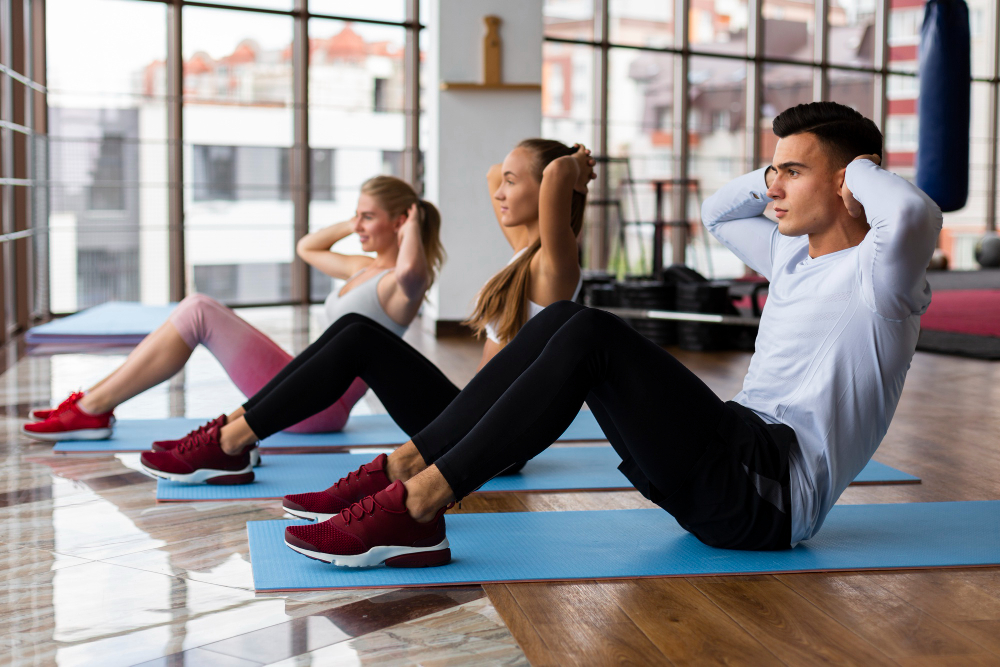In the contemporary hustle and bustle of life, cultivating a lifestyle that prioritizes health and well-being is paramount. Aerobic exercise, with its myriad benefits, emerges as a cornerstone in this pursuit. Beyond the conventional wisdom of a balanced diet, the incorporation of regular aerobic exercise brings about a transformative impact on both the physical and mental facets of our existence.

Table of Contents
What are the Top Health Benefits of Regular Aerobic Exercise?
Embarking on a journey of consistent aerobic exercise unfolds a tapestry of health benefits that extend far beyond just the aesthetic allure of a fit physique. Delving into the intricacies, we uncover a holistic spectrum of advantages that contribute to overall well-being.
What are the Physical Benefits of Aerobic Exercise?
1. Cardiovascular Health
Aerobic exercise is a symphony that orchestrates a harmonious rhythm within the cardiovascular system. Engaging in activities such as running, cycling, or brisk walking elevates heart rate and promotes efficient blood circulation. This, in turn, enhances cardiovascular endurance, reducing the risk of heart diseases and fortifying the very core of our vitality.
2. Weight Management
Beyond the aesthetic allure, aerobic exercise becomes a potent ally in the battle against excess weight. The dynamic, repetitive nature of these exercises expends calories, fostering a healthy balance between energy intake and expenditure. This not only aids in weight loss but also cultivates a sustainable equilibrium crucial for long-term well-being.
3. Strengthened Immune System
A lesser-known marvel of aerobic exercise lies in its ability to fortify the immune system. The heightened circulation of immune cells during and after exercise equips the body to fend off infections more effectively. Regular engagement in aerobic activities thus becomes a shield, bolstering the body’s natural defenses against external threats.
4. Improved Respiratory Health
Breathing, an involuntary act often taken for granted, attains a new level of efficiency through aerobic exercise. The enhanced lung capacity and respiratory function achieved during these activities optimize oxygen intake and expulsion. This not only improves endurance during physical exertion but also contributes to overall respiratory well-being.
5. Bone Health
Aerobic exercise is not confined to cardiovascular and muscular benefits alone; it extends its benevolent touch to our skeletal structure. Weight-bearing aerobic activities, like running or dancing, stimulate bone density, reducing the risk of osteoporosis and ensuring a resilient skeletal framework that withstands the tests of time.
How Does Aerobic Exercise Improve Mental Health?
Beyond the realm of physical prowess, the impact of aerobic exercise permeates the intricate corridors of our mental well-being. Unraveling the psychological dividends, we witness a cascade of positive transformations that transcend the boundaries of mere fitness.
Stress Reduction
In the chaotic cadence of modern life, stress emerges as a ubiquitous companion. Aerobic exercise, however, becomes a potent antidote, triggering the release of endorphins – the body’s natural stress busters. The rhythmic motion and focused exertion offer a therapeutic escape, alleviating the burdens of stress and fostering mental equilibrium.
Mood Enhancement
The euphoria induced by aerobic exercise extends beyond the confines of the gym or jogging track. The release of neurotransmitters like dopamine and serotonin during exercise imparts a profound sense of well-being, uplifting mood and creating a positive feedback loop that extends into our daily lives.
Anxiety Reduction
As an anxiety-reduction strategy, aerobic exercise stands unparalleled. The medley of controlled breathing, rhythmic movements, and the neurochemical cocktail released during exercise collectively act as a soothing balm for an anxious mind. Consistent engagement in aerobic activities becomes a proactive approach to managing and mitigating anxiety.
Cognitive Benefits
The cognitive advantages of aerobic exercise extend far beyond physical fitness. Studies suggest that regular aerobic activities enhance cognitive function, including memory, attention, and problem-solving skills. The increased blood flow to the brain nurtures neural connections, fostering a cognitive resilience that echoes through various facets of our intellectual pursuits.
Emotional Resilience
In the ebb and flow of life’s challenges, emotional resilience becomes a prized asset. Aerobic exercise, by its stress-relieving and mood-enhancing effects, fortifies the emotional fabric of an individual. This resilience becomes a shield against the tumultuous waves of life, allowing one to navigate challenges with a composed and steadfast demeanor.
How to Get Started with Aerobic Exercise
Consultation with a Healthcare Professional
Before starting any exercise program, it’s advisable to consult with a healthcare professional, especially for individuals with existing health conditions or concerns.
Choosing the Right Exercise
Select an aerobic activity that aligns with your interests and physical condition. This ensures a more enjoyable and sustainable fitness journey.
Setting Realistic Goals
Establish achievable goals to stay motivated. Whether it’s a gradual increase in workout duration or reaching a specific distance, realistic objectives are key to success.
Gradual Progression
Avoid pushing yourself too hard initially. Gradually increase intensity and duration to allow your body to adapt and minimize the risk of injury.
Incorporating Variety
Prevent workout monotony by incorporating a variety of aerobic exercises. This not only keeps things interesting but also targets different muscle groups.
Tips for a Successful Aerobic Workout
Proper Warm-Up and Cool Down
Begin each session with a proper warm-up to prepare your muscles for activity. Similarly, cool down afterward to aid recovery and flexibility.
Appropriate Clothing and Footwear
Invest in suitable workout attire and footwear to ensure comfort and reduce the risk of injury. Proper gear enhances the overall exercise experience.
Hydration and Nutrition
Stay adequately hydrated before, during, and after workouts. Pay attention to your nutrition, fueling your body with the right nutrients for optimal performance.
Monitoring Intensity
Listen to your body and adjust the intensity of your workout accordingly. Balancing challenging sessions with rest days is vital for sustained progress.
Consistency
Consistency is key in realizing the benefits of aerobic exercise. Stick to your routine, and over time, you’ll witness improvements in both physical and mental well-being.
Closing Thoughts
In the grand tapestry of holistic well-being, aerobic exercise emerges as a vibrant thread that interlaces physical and mental health. Beyond the allure of a sculpted physique, it weaves a narrative of cardiovascular vitality, mental resilience, and an overall enhancement of the human experience. As you embark on this journey, let the rhythmic cadence of aerobic exercise harmonize with the symphony of your life, orchestrating a melody of health, vigor, and enduring well-being.
What’s the best time to do aerobic exercise?
The beauty of aerobic exercise is its flexibility. Choose a time that fits your schedule and makes you comfortable. Consistency is key!
Can I do aerobic exercise every day?
Absolutely! However, listen to your body. If you feel fatigued or sore, give yourself a rest day or opt for lighter activities like walking or stretching.
Do I need special equipment for aerobic exercise?
Not necessarily. Many aerobic exercises require minimal equipment. A good pair of shoes for walking or running is a great start.
How long should an aerobic session be for maximum benefits?
Aim for at least 150 minutes per week of moderate-intensity aerobic activity or 75 minutes of vigorous-intensity. You can break it down into smaller sessions throughout the week.
Is aerobic exercise suitable for all ages?
Absolutely! Aerobic exercise is adaptable to various fitness levels and ages. Consult with your healthcare provider before starting a new exercise routine.








I like this weblog it’s a master piece! Glad I observed this ohttps://69v.topn google.Money from blog
Hello, There’s no doubt that your blog might be having browser compatibility issues.
When I take a look at your website in Safari, iit looks fine however, when opening in Intefnet Explorer, it’s got some overlapping issues.
I mewrely wanted to provide you with a quick heads up! Apart from
that, excellent blog! https://leetcode.com/u/YDoF0t00tE/
This site was… how do you say it? Relevant!!
Finally I’ve found something that helped me. Kudos! https://WWW.Britishpridebakery.com/post/cambridge-we-are-moving